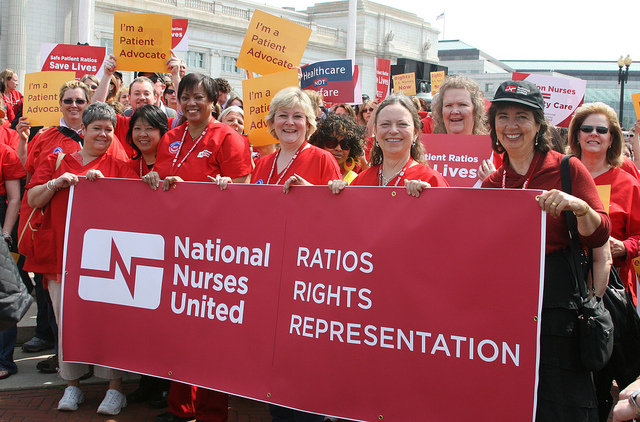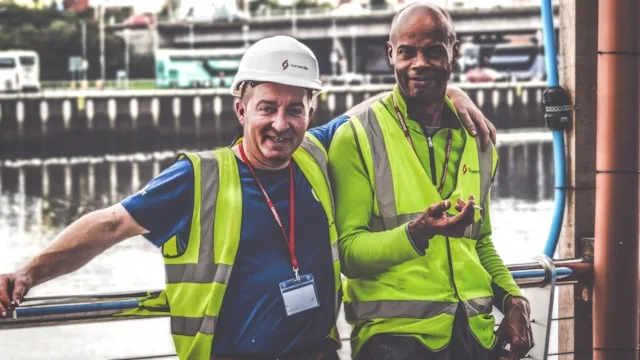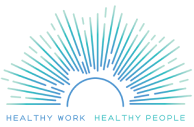Healthy Work Tools
For Unions & Worker Advocates
What is the next step?

If you have collected surveys from enough people using the Healthy Work Survey, you’re probably wondering what to do about these results (beyond what the survey recommends).
While workers need their own personal resources to help them cope, we also provide information about the importance of working together to get organizational change. (See Healthy Work Tools for Individuals to learn more.)
While many unions are already tackling issues affecting #healthy work, unions can be more effective in protecting their members’ health and safety by working to reduce and prevent work stressors. Below we have some recommendations, tools and strategies to help make proposals to the employer about the best action to deal with work stressors and to lobby for new legislation or regulations to make work healthier.
Healthy Work Strategies
Healthy Work Strategies include workplace research studies, programs, contract language, regulations and laws designed to reduce sources of stress at work (work stressors), and to make work and workers healthier. Each report below is a summary about how to improve the organization of work to reduce work stressors, such as:
Long work hours, bullying, sexual harassment, discrimination, threats of violence, understaffing, job insecurity, lack of supervisor or coworker support, work-family conflict, job demands, lack of job control, job strain, and “effort-reward imbalance”.
The types of Healthy Work Strategies include:
Labor-Management Contracts
Contract Language to Reduce Job Stress in Education & Healthcare (Summary)
Jim Beam workers achieve better work-life balance through new labor-management contract
SAG-AFTRA creates code of conduct to prevent sexual harassment in the workplace
Trade union actions to prevent psychosocial risks in healthcare (E.U.)
Work-life balance and trade unions
Hotel Housekeeper Study and Workload Reductions
Hotel housekeepers face a higher risk of injury than other hotel workers, in part due to high workload and pressure to clean hotel rooms quickly. In 1999, the hotel workers union in San Francisco, after documenting hazards faced by the housekeepers, was able to bargain a contract, reducing the quota for rooms cleaned in one day from 15 to 14. Since then, hotel workers and their union (UNITE-HERE) have bargained contracts on workload, conducted research, educated workers and the public, helped pass a California regulation on preventing hotel housekeeper musculoskeletal injuries, and also campaigned against sexual harassment of hotel housekeepers. Find out more and how you can help.
The Pennsylvania Association of Staff Nurses and Allied Professionals
Following a 28-day strike in 2010 at Temple Univ. Hospital, Philadelphia, workers won voluntary 12-hour shifts and overtime, accrual of a sleep day after 16 hours. They rejected shorter minimum call times, and lower weekend and night shift differentials. This kind of contract improves exposure to long work hours and schedules that can affect sleep and reduces workload demands.
Need some sample contract language?
See examples of contract language on job stress and on staffing in a variety of occupations from an excellent Labor and Occupational Health Program (LOHP) book on collective bargaining on occupational health and safety.
Laws and Regulations
Government labor inspectors’ role in protecting workers’ mental health in Quebec
Job redesign and national labor protections have positive effects on worker health and the economy
Laws and regulation to prevent workplace violence in healthcare
Laws prohibiting mandatory overtime for nurses
Laws to improve nurse staffing levels in hospitals in the U.S.
Laws to prevent workplace sexual harassment
Legislation to prevent psychosocial risks in healthcare (E.U.)
Legislation to reduce job stress in education & healthcare (summary)
State laws banning mandatory overtime for nurses, except in case of emergency.
Stress Check: A national policy in Japan for prevention of workplace stress
Work scheduling laws contribute to more stable employment
Workplace bullying prevention laws and regulations
Healthy Families Act
The Healthy Families Act is currently in Congress and would allow workers to earn up to seven paid sick days a year. Creating a national paid sick leave standard would allow millions of Americans to earn the time necessary to recover from illnesses like the flu, access health care and take care of a sick family member.
Schedules That Work Act
H.R. 5159, is a bill in Congress that seeks to remedy “on-call scheduling” nationally. Retail workers, food service workers, cleaners and many other occupations have irregular or “on-call” schedules which play havoc with people’s lives, like scheduling child care at a moment’s notice, or finishing college courses. Success stories addressing these issues include: 1) San Francisco, which was the first city in the U.S. to pass a Retail Worker Bill of Rights (in 2014), and 2) retail workers and others who came together in New York City and successfully passed a law in 2017 that ends “on-call” scheduling in the City.
Portable Benefits for Independent Workers Pilot Program Act
This Act would allow the U.S. Department of Labor to authorize grants to states, local governments, and nonprofits to design new models to provide and implement “portable benefits” (retirement savings, workers compensation, life or disability insurance, sick leave, training or educational benefits, healthcare and more) for independent/precarious workers such as contractors, temporary workers and self-employed workers, and would especially benefit low-wage precarious workers. This bill could help to alleviate some of the stressors related to being a precarious/gig worker.
Workplace Research Studies and Programs to Reduce Work Stressors
These workplace research studies and programs, published in scientific journals, were selected because they were designed to reduce sources of stress at different workplaces in order to improve employee health (health promotion programs intended to change individual behaviors are not included). Many include a participatory “action” research focus, which means they involved workers, labor and management in a process that was intended to create positive change. These studies document the effects of workplace programs and policies and provide important details about the process of changing working conditions—so that you can see if such a process might work in your workplace or industry.
Health Care
Reducing work stress and improving the mental health of hospital workers (Quebec, Canada)
Manufacturing
Job redesign at a sweets manufacturing company in England
Public Sector Workers
Increasing job control and reducing other job stressors among call center workers in England
Redesigning the jobs of postal workers in Uppsala, Sweden
Supervisor Support and Work-life balance
Teachers/Education
Workplace policies and programs to reduce job stress among K-12 education staff (U.S.)
Transit Workers – bus drivers
Action research intervention with urban bus drivers in Copenhagen, Denmark
Bathroom access for bus drivers in the US and Canada
Intervention to reduce job stress among urban bus drivers in Stockholm, Sweden
Preventing threats and violence against bus drivers
Programs and policies to reduce work stress among bus drivers in the United States and Canada
Workplace bullying/discrimination/violence
A training program for workers and managers on reducing male bullying and workplace violence (U.S.)
If you are interested in learning about “reducing COVID-19-related work stressors”, visit our Healthy Work Strategies page for more info.
Organizations* that Promote Healthy Work
For more information, guidance and strategies for effective work organization change, check out:
A Better Balance
A Better Balance is an organization that “seeks to reduce the stress of conflicting work-family demands and responsibilities, as well as end discrimination against workers (most of whom are women) who care for their children or other family members.” They pursue campaigns to strengthen legal protections and to advance policies that provide paid leave, paid sick time, fair and flexible work, workplace equality (including gender equity), pregnant worker fairness and breastfeeding support at work. They offer you resources and information on these issues and your rights at work.
Coalition for Restaurant Safety and Health
Coalition for Restaurant Safety and Health (CRSH) is a Philadelphia-based coalition that helps restaurant workers and owners identify and prevent sexual harassment. Although sexual harassment pervades the restaurant industry, restaurant workers often do not report it. They may think that their treatment comes with the job. They may fear retaliation for reporting, or they may believe that their employer won’t do anything to address it. CRSH offers free trainings to restaurants to prevent sexual harassment and to promote respectful and safe workplaces in the restaurant industry.
Family Values at Work
Family Values at Work (FV@W) grew out of the recognition that valuing caregiving and enabling people to be good providers and good family members is key to achieving racial, gender and economic equity. Labor Project for Working Families (LPWF), a long-standing initiative now working in partnership with FV@W, raises the visibility and engagement of labor unions in state FV@W coalitions. See their resources and toolkit.
Fight for $15
Fight for $15 is a movement that began in 2012 when 200 fast-food workers walked off the job to demand $15/hr and union rights in New York City. Today, it is a global movement in hundreds of cities on six continents. It includes fast-food workers, home health aides, child care teachers, airport workers, adjunct professors, retail employees—and underpaid workers everywhere. If you are struggling with low wages and making ends meet, find information, support or join the Fight for $15 movement. Even if you are not a low-wage worker, you can still help support the struggle for fair, living wages for all workers.
Hazards Campaign
The Hazards Campaign is a UK-based network of resource centers and worker advocates supporting worker organizing and campaigning for justice and safety at work.
Their manifesto suggests:
-
- Ending deregulation and restoring regulation and enforcement as a social good
- Developing a health and safety system based on prevention, precaution and participation
- Providing real, enforceable employment and safety rights to ensure good health and safety in low paid and precarious work via joint enforcement agency working
In order to achieve a health and safety system fit for workers at the heart of decent jobs and decent lives.
For their resources on stress and mental ill health in the workplace, visit here.
International Labor Organization (ILO)
The International Labour Organization (ILO), a U.N. agency since 1919, brings together governments, employers and workers from 187 member states, to set labor standards, develop policies and devise programs promoting decent work for all women and men.
Stress Prevention at Work Checkpoints is an app and a manual designed for use by anyone interested in workplace stress prevention: national authorities, company and organizational managers, trade unions, human resource personnel, and occupational safety and health practitioners. The ILO SOLVE program is also available to download. It is an interactive educational program designed to assist in the development of policy and action to address health promotion issues at the workplace. It deals with the prevention of work-related stressors (both workplace stress and economic stressors), alcohol and drug abuse, violence (both physical and psychological), the prevention of HIV/AIDS, as well as the promotion of tobacco-free workplaces and health lifestyles, including good eating, sleeping and exercise habits. It includes guides for trainers and participants.
In January 2019, the ILO’s Global Commission on the Future of Work released the report, “A Human-Centered Agenda Needed for a Decent Future of Work.”
Among the ten recommendations are:
-
- A universal labour guarantee that protects fundamental workers’ rights, an adequate living wage, limits on hours of work and safe and healthy workplaces.
- Guaranteed social protection from birth to old age that supports people’s needs over the life cycle.
- A universal entitlement to lifelong learning that enables people to skill, reskill and upskill.
- Managing technological change to boost decent work, including an international governance system for digital labour platforms.
- Greater investments in the care, green and rural economies.
- A transformative and measurable agenda for gender equality.
- Reshaping business incentives to encourage long-term investments.
National Council for Occupational Safety and Health
The National Council for Occupational Safety and Health (NCOSH) is a federation of local and statewide “COSH” groups—committees/coalitions dedicated to advancing the rights of workers related to health and safety issues, regardless of their immigration status. COSH groups are typically non-profit organizations. You can find a local COSH group near you or find information about starting one.
National Institutes for Occupational Safety and Health (NIOSH)
NIOSH resources on Non Standard Work Arrangements include workers considered temporary, contingent, part-time, on-call, direct hire, agency, contract, app-based, on-demand, freelance, and gig workers. Independent contractors do not have a legal right to a safe workplace and are not legally eligible for workers’ compensation benefits if they are injured on the job. Many non-standard, low-wage workers do not earn minimum wage. Studies have shown that non-standard workers are more likely to get injured on the job and are more likely to become ill compared to permanent workers which may be related to a lack of paid sick leave. OSHA and NIOSH have developed a joint guideline for employers of temporary workers (e.g. staffing agencies): Recommended Practices for Protecting Temporary Workers and Cal OSHA has also produced a Safety and Health Fact Sheet on this issue.
NIOSH resources on sleep, fatigue, shift-work and long hours: A significant number of U.S. workers are exposed to health and safety risks associated with shift work, long work hours, and related workplace sleep and fatigue issues. If you are working in the aviation, transportation, and healthcare industries, are an emergency responder, or otherwise find yourself working long hours and night shifts, this can be particularly dangerous to your health and well-being. NIOSH has made available a webinar series and other resources about how shift work and long hours affect fatigue and sleep, as well as providing training and resources for coping with them.
Oxfam America – Best and Worst State to Work in America index
This tool ranks states according to their wage policies (changes to federal minimum wage), worker protection policies (paid sick leave, pregnancy protections and equal pay), and right-to-organize policies. They also show that there is a relationship between a state’s ranking in the Best State to Work Index and positive economic and health indicators. The higher the index, the less infant mortality and poverty rates, and the higher the life expectancy, median income, GDP per capita, and labor force participation rates in that state.
Restaurant Opportunities Center United
ROC United is the leading restaurant workers’ rights advocacy organization in the country, representing thousands of people who work in restaurants, over 750 high-road employers, and thousands of engaged consumers united for raising restaurant industry standards. With the mission to improve wages and working conditions for the nation’s restaurant workforce, they have also been a leader in addressing sexual harassment and discrimination in the restaurant industry.
Workplace Bullying Institute
Workplace Bullying Institute (WBI) is an organization in the U.S. that has been offering comprehensive resources about workplace bullying—for individuals who have been bullied and to organizations that want to address bullying in the workplace. WBI includes self-help advice for individuals, personal coaching, research, books, public education, union assistance, training for professionals, employer consulting, and legislative advocacy. In 2001, WBI launched the Healthy Workplace Bill, which has now been introduced in 31 states/territories. If you feel you want to get involved in supporting this bill in your state, see how you can help.
Worksafe
A California-based organization (part of the National Council for Occupational Safety and Health), Worksafe is dedicated to promoting and protecting the basic right of all people to a safe and healthy workplace. You can get free worker trainings about health and safety rights, hazard awareness, immigrant rights and workers compensation. You can also get resources to find out how to file an OSH complaint, address retaliation, or protect yourself as a whistleblower.
*These are just a few examples of organizations that could provide resources to learn how to more effectively work together to address #healthywork. There are many more such organizations.
Work Stress Educational Materials for Unions
- AFT Job Stress Factsheet
- AFT Educator Quality of Life Survey 2017
- AFT Survey Results – Teaching Less Stressful when Collaborative (Oct. 2017)
- HWC Resources for Workers & Unions to Document & Reduce Job Stress
- ILO Stress Prevention at Work Checkpoints
- NIOSH Stress at Work Guide
- PEF Occupational Stress Factsheet (2013)






